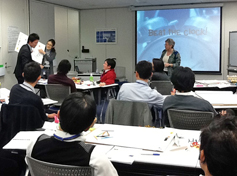One of my favorite things about the work I do is the new experiences I get to enjoy – and especially the new things I learn from them!
I once spent 10 days in Asia working with a corporate client. The first half of the trip was my second delightful visit to Singapore; I was there the previous year for this same client. The second half was a little more adventurous: my first trip to Tokyo, Japan and to a country where English is not the predominant language.
 My workshop in Tokyo
My workshop in Tokyo
My client, based in Singapore, worked with a multi-country network of people who train her company’s sales consultants on how to sell and use its highly technical products. In both Singapore and Tokyo, I led a two-day workshop that focused on transforming those subject-matter experts (SMEs) into “facilitators of learning.” That is, participants would learn how to design and lead programs that actively engage learners and enhance their abilities to apply what they’ve learned.
Some things I learned (or confirmed) along the way….
• Leading learning in a country other than your own adds another, potentially significant, layer to preparation and planning.
Knowing your audience is a key tenet of adult learning; in another country, you also have to become familiar with that audience’s culture. Knowing what to do – and what not to do – can help avoid potential gaffes and demonstrate thoughtfulness and consideration to your hosts. And it helps you determine what changes you may have to make to the program to suit learning approaches to the audience.
Be careful about relying only on the Internet or “book learning.” Cultivate local relationships; at the very least, talk to others who have worked in the target country to get a better sense of what to expect. Don’t expect to just transplant your professional development opportunities to another culture “as is.” At the same time, don’t assume things will have to be significantly different, because…
• Adult learning principles apply regardless of culture.
I’ve been asked about this a number of times by U.S.-based learning professionals who plan learning events in other parts of the world. For at least the Asia Pacific region it’s true, in my admittedly limited experience. Adults want to be engaged in learning and want to know how the content is relevant to them. Active learner engagement is a new idea in some cultures, yet once its relevance to effective learning is explained and – more importantly – demonstrated, it is enthusiastically embraced.
In my workshops, I model the behaviors I’m asking participants to embrace; they get to experience first-hand how and why what they’re learning about works. It was no different in either Tokyo or Singapore (the latter with learners from about 8 or 9 Asia Pacific countries present). On the advice of a Tokyo participant, I made one minor adjustment in my approach there to full-group discussions. Instead of my usual practice of asking the entire group a question and encouraging people to volunteer their responses, I asked specific individuals to share their opinions…and they did. It was explained to me this is the only way Japanese participants, in a group setting, will offer what they are thinking. Beyond that, participants’ questions, ideas, and engagement levels were no different than in any of the workshops I’ve led elsewhere.
• Language barriers don’t preclude engagement – as long as you prepare ahead of time and have the right team in place.
In Tokyo I had two new experiences: having my words simultaneously interpreted into another language literally as I said them, and relying on an interpreter to understand what participants were saying. I was a bit nervous about being able to effectively engage participants in a workshop conducted in two languages. Added to the language issue, Japanese culture typically does not encourage interaction or collaboration in the learning environment. Yet my client’s goals involved getting participants to experience both and, furthermore, to teach them to apply those approaches as facilitators of their own learning opportunities.
If you use interpreters, consider them part of your learning team and a key element in your success. My client and I met in advance with our three-member interpreter team to discuss roles and expectations; I gave them my handout, slides, and speaking notes to use as references. Thanks to the interpreters’ skill and professionalism, the only thing I had to do differently was slow my pace a bit to ensure I didn’t get too far ahead of their interpretation. With their help, I facilitated the workshop the same way I always do. It was a very positive experience that I won’t hesitate to do again any time, anywhere.
• Relax…and enjoy the experience!
The opportunity to do something you enjoy while experiencing another culture is priceless. Take every advantage of it! I had great fun facilitating these two workshops and learning more about Japanese and other Asian cultures. Better still, it was fun talking with participants over lunch and dinner, especially as we tripped a little over language. I have to say this: several of my new Japanese friends spoke English far better than I did Japanese!
 East Garden entrance, Japan’s Imperial Palace
East Garden entrance, Japan’s Imperial Palace
Our world is getting smaller every day; the more we can share ideas and learn together across cultures, the better our world will be. Traveling to another country? Have an open and curious mind. Be as prepared as you can be for whatever you’ll be doing. You’ll feel confident and enthusiastic…and enthusiasm is contagious in any language!